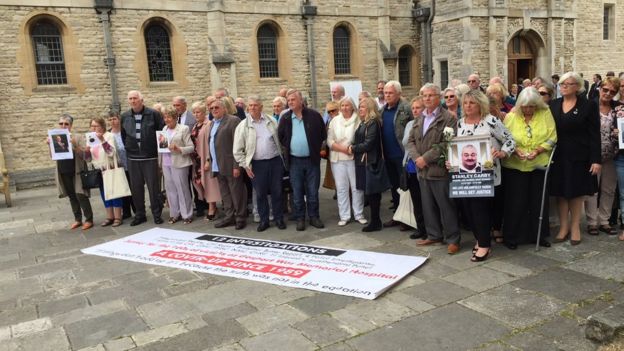The Healing Arts
"There was a disregard for human life and a culture of shortening the lives of a large number of patients by prescribing and administering 'dangerous doses' of a hazardous combination of medication not clinically indicated or justified."
"[Records show that] whereas a large number of patients and their relatives understood that their admission to the hospital was for either rehabilitation or respite care, they were, in effect, put on a terminal care pathway."
"[Dr. Jane Barton was] responsible for the practice of prescribing which prevailed on the wards."
Bishop James Jones, chairman, enquiry panel
 |
| Dr Jane Barton worked at the hospital for 12 years. Photograph: Chris Ison/PA |
Found guilty of "multiple instances of serious professional misconduct" in 2010 by the General Medical Council of Great Britain, this woman who institutionalized the practise of administering opioids without medical justification in the British hospital she headed, retired soon afterward. It was, however, the deep and lasting harm she imposed on vulnerable and ill seniors brought to the hospital in the belief by family members that their loved ones would be safe and well looked after, that marks her name with infamy.
Hospital senior management, health-care organizations, police, prosecutors, local politicians and medical authorities all had failed in their civil-social and professional duties to ensure patients were protected and were found responsible when their interests were "subordinated to the reputation of the hospital and the professions involved." "They have grossly failed their ethical standards by abusing people's human rights [in view of] vulnerable relatives who were stripped of their final words to their loved ones, silenced by overdoses", accused the granddaughter of one victim.
Gosport War Memorial Hospital in southern England underwent a rigorous three-year investigation of its practices between the years 1989 and 2000 to account for 833 death certificates signed by Dr. Barton. Over a million pages of documents were examined leaving the enquiry with the conclusion that 456 patients lived lives shorter than they should have, with an additional 200 more "probably" similarly affected.
In very point of fact, two hospital nurses made an effort to raise the issue expressing their concerns 27 years ago in 1991 with respect to prescribing practices that troubled them. Those two nurses' concerns were ignored, leaving them "ostracized" in the workplace. The panel of enquiry found inappropriate use of opioids began in 1989, steadily increasing until 1994 when the practise plateaued until a decade later then rapidly declined. No additional cases were reported in 2001.
Many deaths might have been avoided had the hospital treated the nurses' concerns seriously.
Medication prescribed by Dr. Barton had contributed to six patients' death according to inquests conducted in 2009 and 2013. The panel was exposed to comments about her "brusque, unfriendly and indifferent manner, her "intransigence and worrying lack of insight", into effects her actions resulted in, along with her inability to "recognize the limits of her professional competence".
Medical records confirm that over a twelve-year period as clinical assistant Dr. Barton was responsible for and central to "prescribing any medication required". As for the police; family members were treated as though they were troublemakers by investigators who deferred too much to the hospital.
 |
| Families of those who have died at Gosport Memorial Hospital gathered at Portsmouth Cathedral to hear the findings of the inquiry BBC News |
Labels: Britain, Deaths, Hospital, Malpractise, Opioids, Patients

<< Home